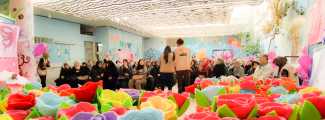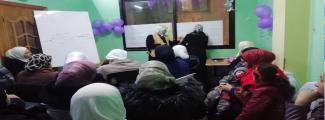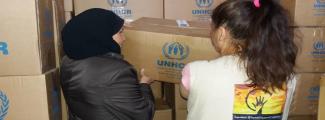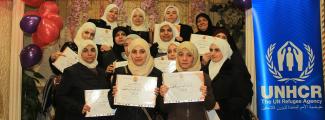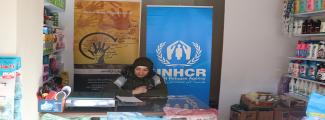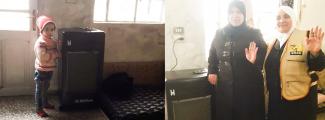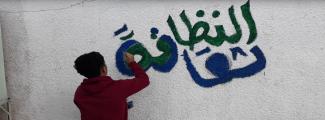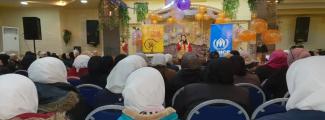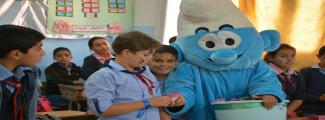International Women’s Day (IWD) is celebrated on 8th of March each year to honor women and their contributions to the community. It is a day to recognize their great efforts and gains; to recall their benevolence and strive throughout the years.
Out of the belief of women’s capacity to develop the community, the GBV team attached to SSSD, in cooperation with the UNHCR, conducted events throughout the centers of Rural Damascus (Adra, Jaramana, Al-Hameh, Sayyedah Zainab) targeting women, men, adolescent boys and girls, and children.
Need: celebrating IWD.
Target: introducing IWD, the important role women play in the community, women’s abilities to overcome obstacles, empowering women, underpinning the importance of gender equality.
Jaramana, Athar Al-Frashah Center
Mother’s Group:
The team welcomed the women, offering them a flower labelled with their names and attaching it to the slogan of the event “Gender Equality for a Better Future” subtly introducing IWD.
The adolescents performed a play titled “Bisan” narrating the story of a girl who was subject to several types of parents’ abuse throughout her life; however, she finally overcomes domestic violence. The attendees agree that the girl’s story resembles their suffering, all of them faced difficulties and were subject to violence. Many of them were deprived of work due to husband’s jealousy or fear of wife’s success. Hearing the women’s opinions, the team highlighted the different types of gender-based violence.
Afterwards, the team asked the women “Were women able to overcome these difficulties and achieve their ambition?” They unanimously replied “The situation improved during the war, we have become aware of our rights attending sessions. We know that successful women are on par with successful men. We know how to manage our families properly. Women might be able to overcome some of the difficulties- not all of the difficulties. It depends on the environment.” Hearing their reply, the team asserted that each woman is capable of overcoming all sorts of difficulties; each woman can claim her rights and reach self-fulfillment through building mutual understanding with her husband.
Later, the team elaborated on the topic of gender equality, namely, rights and social roles. Women’s opinions covered the following: Women are deprived of their right to education, married at a young age. They are also deprived of their right to work, out of fear of being harassed. Women are responsible for housekeeping and raising up the children, whereas men are only responsible for providing for their families. Women do not have the right to choose their spouses.
The team inquired about the reasons of violence (customs and habits, the community, power is only given to men). Drawing on their answers, the team asserted that these reasons are weak and that each woman should believe in herself, her abilities and strength. Each woman is capable of achieving her targets.
Next, adolescents performed a play shedding light on the roles women and men play. The play underpinned the importance of proper communication and participation in establishing a healthy husband-wife relationship and a healthy family. The team then read aloud the supportive messages (You and I are capable of miracles. He and she establish love, family, and happiness..strength shine out of the couple)
Then a lawyer introduced the main changes of the civil status law and handled all the inquiries revolving (marriage contract and witnesses, marriage age, guardianship of children, dowry, divorce, alimony).
The event was concluded by a comedy play performed by the women’s committee narrating the new changes of the civil status law and sending messages (I am ambitious and strong. I will be in charge and prove that I could be successful.)
Al-Hameh, Salam Center
Women’ s Group:
The team distributed posters in the main street to introduce the event. The volunteers distributed brochures, reaching out to individuals and attracting them to the exhibition.
The team welcomed the attendees, offering each one of them a flower and directing them to the exhibition, which displayed handicrafts, recycled handicrafts, sewing products, Aghabani, accessories, detergents, meals, and sweets.
An adolescent girl delivered a poetry introducing IWD and the event, and then each woman participating in the exhibition introduced her products, how to make them, and the available tools she relied on, as detailed.
- One of the women recycled simple materials and expired items into beneficial, neat and beautiful items.
- Another woman shared her experience, talking about her training workshop in making detergents, shampoos, hair conditioners, hand and feet lotions, and how it boosted her income. She also talked about the importance of the exhibition in networking and attracting new customers.
- One woman expressed her happiness, “The feminine side could be creatively reflected in simple pieces of accessories.”
The reaction of the attendees was favorable.
One woman said, “I was not aware of IWD. This day creates a space for self-expression and provides a chance to show off women’s creative and productive sides.”
One man said, “It is beautiful to witness and celebrate IWD, especially during times of crisis, given the sudden changes of family roles, which of women were able to prove they were great achievers, regardless of the community limitations exerted on them and the very limited resources allocated.”
The team concluded the event by saying, “Relying on their artistic and creative spirit and their feminine side, women could achieve their goals, prove themselves, and activate their social role. The community will always impose obstacles against the progress of women.”
The exhibition was like a train station at Qudsaya Park. It was the first time the team targets beneficiaries from Qudsaya, introducing SSSD and its services. It was also remarkable to witness the attendance of some key persons from the area, a manager of a private hospital and a group of teachers.
The exhibition acted as a bridge connecting participating women with shop owners, who reached out to the woman requesting some samples, particularly shampoos and cleaning tools. One accessory shop owner struck a deal with the woman who makes accessories.
Adra, Farah Center
Women’s Group:
The team began the celebration by welcoming the women and delivering a poem to instill a sense of pride, and then introduced IWD (working women in New York fought for their rights for years).
Next, the team displayed a video about the life stages of women and related social roles and discussed the content with them. The women were impressed by the video, one of them said, “The part that shows how the girl helped her elderly parents really touched my heart, as it underpins the giving spirit of females and their great multitasking abilities, as opposed to males who might neglect looking after their parents, as a result of their responsibilities and life pressures.”
Later, the women attended a play and expressed their admiration of the performance that reflected reality in detail, wishing that men would really play women’s role for one day to get the real feel women experience and the huge responsibilities they manage.
In closing, the adolescents of the center performed a dance show, congratulating women on IWD and spreading happiness. The team then distributed cards, asking each woman to write down greetings to another woman present in the event, a mother, a friend or a close neighbor. The team also encouraged women to do something special on this day, like making a cake or practicing a hobby. Women’s reactions were great, they exchanged greeting cards and expressed their joy and gratitude for the efforts exerted by SSSD team.
“This day is ours; this beautiful place gathers us; we can collectively celebrate and enjoy our self-worth.”
Sayyedah Zainab, Dafa Center
Women’s and Men’s Group:
The team began the event by welcoming the women and introducing IWD, and then displayed a historical video of IWD, highlighting women’s great roles in families and communities throughout the years. Many men from the audience were impressed by the video.
Next, a theatre sketch was performed, talking about a husband mistreating and belittling his wife, ordering her to fulfill all of his needs. The team then swiftly introduced women’s rights, the most important ones: the right to education, gender equality, the right to work, inheritance rights, freedom of expression, the right to choose a life partner, the right to choose pregnancy time when the woman is physically and emotionally prepared… etc.
Then the team heard the opinions of women on their duties (look after the husband and kids, raise up the kids and instill high values toward love, cooperation and respect.)
The team stressed that gender equality advocates equal rights and equal duties, which guarantees a happy and successful life for males and females. Gender equality empowers women to overcome difficulties and achieve success, which is positively reflected on women’s lives and their relationships with their spouses and kids.
Afterwards, the adolescents performed a dance and closed it with supportive statements (It is your right to enjoy practicing your favorite hobby. It is your right to participate in social activities. You resemble half of the community and you make the other half.)
Later, the team displayed a group of photos of women who were able to recraft history, proving that women are capable of taking on heroic and great roles in life, even though they faced huge obstacles, the community’s stereotypes (women are weak, their abilities and skills are limited). These women were and are still live examples of strong will and success, they had to play men’s roles and they were able to obtain some of their rights, during the crisis and post crisis.
The team discussed the obstacles women face, limiting their self-fulfillment, such as, pushing them to be obedient to the husband, forcing them into early marriage and denying them of their rights. Growing up, females are weakened as part of the social norms and customs.
A child from the center and a woman composed and delivered poems pertaining the ramifications of denying women of their rights on the physical, emotional, and social aspects, such as, isolation, anxiety, divorce, revenge, and suicide... etc.
To close up, the volunteers prepared and displayed a video, telling the story of a woman who was denied of her rights throughout her different life stages and how she was determined to succeed and fulfill her ambition.
Toward the end of the event, the attendees reached a conclusion that de-activating women’s role adversely affects women and their families, whereas activating their role contributes to community development and prosperity.
Women suggested many solutions: Conduct awareness sessions, targeting different age groups, especially males. Enroll women in vocational training courses, empowering them to work inside or outside their homes. Activate laws supportive of women. Conduct activities at the center that support effective communication and highlight the importance of dialogue and mutual understanding as means of avoiding conflict.
Ending the event, some of the women hailed positive words expressing self-worth, self-appreciation and self-care: “Each and every year, we are the mother, the sister, and the friend. We are the strength, the generous givers to our kids and spouses.”
Adolescents’ and Children’s Group:
The event started off with welcoming the children and adolescents and introducing IWD by displaying a video, telling the story of a woman who practiced her rights, while growing up and during marriage, and how it positively affected her life. Some of the impressing comments of the children on the video, “A mother is a safe haven for her children.” “A girl is successful when she practices her rights and receives support from the people around her.”
Next, the team displayed a video of a TV program that delivers questions related to gender equality in terms of rights and duties and the children were given the chance to respond. Their opinions pertaining rights revolved around: the right to play, the right to non-discrimination, the right to education, the right to healthcare, and the right to live with a non-violent family. The team asserted that gender equality should be practiced by males and females. As for duties, the children’s opinions were: respect others, commit to ethical values role- modeled by the parents, study and work hard. The team asserted that males and females have the same rights and duties, and that each right someone gains is intertwined with an obligation, he/she should fulfill.
A group of children from the center delivered poems, shedding light on the important role women play in the community and how to invest in their capabilities and multitasking skills to improve their lives.
Later, the team displayed a video, telling the stories of remarkable women throughout different historical eras. These women were leaders and geniuses, and had shown extinguished physical and innovative abilities. The children then told stories of successful women from their community.
Afterwards, the team opened up discussions with the children regarding the physical, emotional and social effects, as a result of denying women of their rights, de-activating their contribution to the community. The opinions of the children revolved around: depression, weak personality, isolation, sadness, the community moves backward.
The team summarized the views of the children and then moved to displaying a video prepared by the volunteers, telling the story of a woman who was denied of her rights throughout her different life stages and how she was determined to succeed and fulfill her ambition. The children hailed some of the statements they heard in the video:
- “Being a woman is not an underprivilege. On the contrary, prove to yourself and to the world that you are strong and capable.”
- “You have so many rights, do not allow anyone to deprive you of them.”
- “Life is all about hardship, never give up, be patient and determined, fight, and you will achieve success.”
The children proposed the following: Strict laws forbidding the parents or the husband from denying females of their rights. Illiteracy courses targeting different age groups, especially women.
Closing up the event, the children collectively hailed:
- “Each and every year you resemble strength and generous giving.”
- “Thank you for being there for us.”
- “Gender equality guarantees happiness and success to both genders.”

